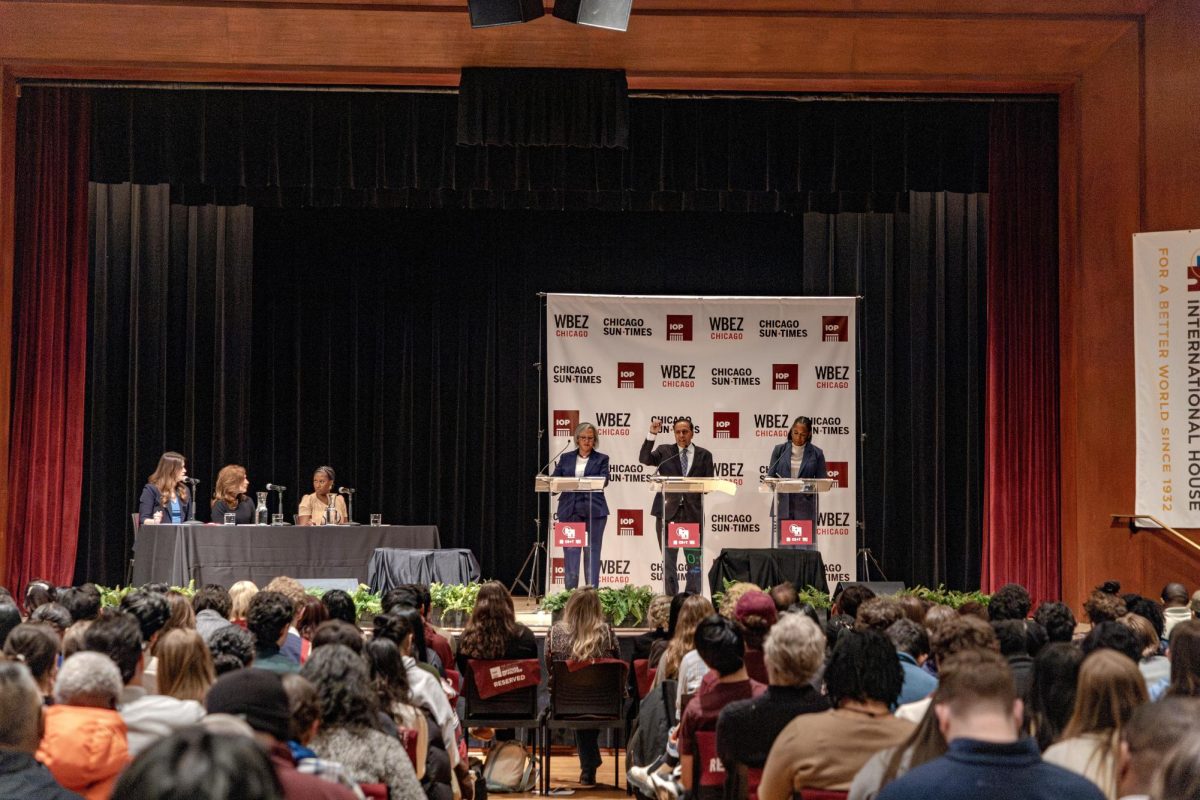About 100 demonstrators demanded that the University implement a Gaza Scholars at Risk initiative during a protest Tuesday afternoon. Faculty & Staff for Justice in Palestine (FSJP) organized the rally, which took place outside Stuart Hall while University President Paul Alivisatos and Provost Katherine Baicker met with the Council of the University Senate.
The Gaza Scholars at Risk initiative came out of negotiations between UChicago United for Palestine (UCUP) protesters and University administrators during last spring’s encampment. Per their website, FSJP “supports and amplifies the work of Students for Justice in Palestine” (SJP), a UCUP coalition member organization.
A recent WBEZ article published a May 4 email from Baicker in which she committed to “an initiative for Gaza Scholars at Risk,” which would apply to up to eight scholars “affected by the war in Gaza,” consistent with the existing Scholars at Risk (SAR) program. The program, established in 1999, “support[s] scholars affected by conflict around the world” whom the SAR Committee, which was formed in 2022, recommends for temporary positions. Per Baicker’s email, a “Gaza Scholars at Risk committee will be charged with identifying and supporting applicants who meet these criteria.”
FSJP maintains that the University has not upheld Baicker’s written promise in implementing the initiative.
In a statement to the Maroon, a University spokesperson wrote: “Recently, the Scholars at Risk program at the University of Chicago has been mischaracterized. The program remains focused on supporting scholars at risk and upholding the University’s commitment to academic freedom.”
During UCUP’s encampment on the quad in the spring of 2024, UCUP posted on social media that their negotiators were successful in having the University establish a “Gaza Scholars at Risk Initiative, which will bring 8 at-risk Palestinian scholars to work and study at UChicago.” At the time, the University said there were “material inaccuracies and mischaracterizations in the information being shared on social media.”
A University spokesperson also told the Maroon in a statement that one scholar “impacted by the conflict in Gaza” is already on campus as a part of the existing SAR program and is set to begin teaching in winter quarter. FSJP told the Maroon the scholar is not from Gaza but from the West Bank and was not brought under a distinct Gaza Scholars at Risk initiative.
The FSJP rally began with around 70 protesters gathered outside of Stuart Hall chanting and holding signs. At approximately 3:30 p.m., after more people joined the rally, about half of the protesters entered Stuart Hall and gathered in the hallway in silence while holding posters, remaining there for 20 minutes before rejoining the group outside. The rally consisted of speeches, chants, and songs.
Most protesters dispersed by 5 p.m., though three protesters remained in Stuart until the Senate meeting’s conclusion around 5:20 p.m. As Alivisatos and Baicker left the meeting, the protesters told them, “Gaza will haunt you,” during a brief interaction.
At least four University of Chicago Police Department officers and several deans-on-call were present at the rally.
“The University’s refusal to announce and implement the Gaza Scholars at Risk initiative exposes, yet again, what its policy of ‘institutional neutrality’ really means. It means speaking publicly and taking public action about political issues that align with trustee and ruling class interests (e.g. Ukraine, Trump’s immigration policy, the Obama Center) while refusing to do so about issues that jeopardize those interests,” read an FSJP press release shared in advance of the rally.
The first speaker at the rally referenced the May 2024 email in which Baicker wrote of the University’s commitment to an initiative for Gaza Scholars at Risk.
“Six months later, the University has yet to make any announcement regarding the Gaza Scholars at Risk initiative,” the speaker said. “The University has repeatedly attempted to gaslight students, faculty, and the public into believing that it did not agree to form a distinct initiative.”
The speaker said UCUP stood by the demands it had previously made. “We continue to demand that the University divest from genocide, disclose its investments, and repair what is now irreparable damage being done to the Palestinian people. You are standing in the cold… for the liberation of the Palestinian people and liberation of all oppressed people throughout the world,” she said.
Hassan, an SJP-affiliated speaker and former student, told protesters, “The United States and Israel have made it normal to bomb hospitals, every single day, to slaughter children, to systematically liquidate two million people… Are we gonna be silent about that?” Protesters chanted back, “No!”
Hassan also accused Baicker of “price-gouging insulin,” referencing her position on the board of directors of the pharmaceutical company Eli Lilly, where she has served since 2011.
“So she is very well aware of how to lie and gaslight and compromise her principles instead of standing up for what is right,” he said.
K. J. Hickerson, an FSJP-affiliated speaker and assistant instructional professor, called on Baicker and the University administration to “rise up to the standards of [the] University’s principles.”
“The Gaza Scholars at Risk Initiative is an opportunity for us to show that our institution can rise to meet the demands of contemporary challenges in order to build a more just and equitable future,” Hickerson said.
Nathaniel Rodwell-Simon contributed reporting.
















Lisa Bernstein / Dec 31, 2024 at 12:31 am
You should publish the email